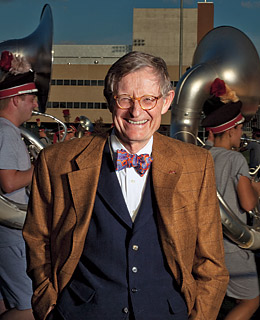
Gordon Gee's school is known for football and a band that marches in cursive, but universities today must be engines of regional economies, he says. Not all college presidents agree.
(2 of 3)
Gee surrounds himself with advisers lured from the world of politics and revels in the networking and back-scratching so essential to getting stuff done in this world. His entire career has been spent in the rarefied world of academia, but he does a pretty good impersonation of an ordinary guy — right down to milking a cow at a county fair and laughing when it pooped on his shoes. No elected official more carefully orchestrates a calendar. A typical planning session finds Gee hatching plans to stroke every conceivable constituency in the course of a single week. Along with his tour of Ohio counties, he contemplates a speech to the state's public school superintendents, a drop-by at a dinner to woo new medical school faculty, a visit to a root-beer stand owned by the parents of an undergraduate, a dinner with Indian immigrants as preparation for a trip to India, a "surprise" visit to Cleveland superlawyer Fred Nance, a pop-in at a birthday party for a prominent Cincinnati lobbyist, a speech on the importance of art in high schools, and an outing with students to see the latest Harry Potter movie. "I am, after all, the oldest guy who owns a Nimbus 2000," Gee brags of his replica flying broomstick.
"There should be no wasted moment," he admonishes his staff, filling an unusual empty Sunday with a quick hop on a private jet to visit an elderly donor. Gee's ceaseless and cunning campaign has him well on his way to a $2.5 billion fundraising goal, and it helped him emerge as a rare winner in Ohio's savage budget battle this year. Walloped by the recession and struggling with the long-term decline of heavy industry, the Buckeye State was neck-deep in red ink, but when the cutting was done, higher education was largely spared, and Gee was one reason why.
"He's an exceptional leader," Governor Ted Strickland says, "and we have a good personal relationship, but even more important, we have an alliance. We both believe that the greatest competitive advantage we have going forward is the intellectual and creative strength of our universities and colleges." Before the economic crash, this alliance helped produce a deal by which the state increased funding for higher education. In exchange for more funding, OSU and other public institutions accepted a two-year freeze on tuition hikes, after a decade of increases far outpacing inflation.
The freeze was expiring last summer when Gee received word that the new budget would again go his way. Summoning his senior staff, he delivered a political masterstroke: Ohio State would volunteer to continue the freeze. Could the school use more money? Sure. But holding the line on tuition at $8,406 for Ohio residents (out-of-staters pay more than 2½ times as much) would be popular with students, their parents and the lawmakers at the state capitol. The legislators had come through for him; now he would make them look good. "It's a political decision," Gee told his team.
The press release went out the next day. With varying degrees of reluctance, other public institutions in Ohio followed Gee's lead.
Go East, Young Man
Gee, 65, a descendant of Mormon pioneers, was born in the remote Utah town of Vernal. After graduating from Columbia University's law school and clerking for Chief Justice Warren Burger, he found his way in the late 1970s to West Virginia University and became president in 1981. He has been running universities ever since. In 1985, Gee moved to the top job at the University of Colorado, which he left in 1990 to become president of Ohio State. In a nomadic life of many promotions and many moves, Gee connected viscerally with Ohio in a way that only tragedy can produce. Shortly after he arrived in Columbus, his wife Elizabeth fought a losing battle with cancer, and he still talks movingly about the way the community supported him and his daughter Rebekah. But his first stint at OSU was sometimes rocky. He failed to push through a reorganization of the school's arts-and-sciences bureaucracy, and he clashed repeatedly with then governor George Voinovich over funding — Gee got into trouble for saying publicly that "the governor's a damn dummy." When Brown University came calling in 1998, Gee jumped.
Wexner believes that Gee's ambition drove him to seek an Ivy League presidency but that his heart doomed him to unhappiness. "I think Gordon discovered that getting to the Ivy League is more fun than being in the Ivy League, which seems terribly insular," Wexner explains. Gee agrees that he never adopted the cautious reverence for old habits that institutions with long and precious traditions are steeped in. Gee's lavish renovation of the president's mansion and his steamroller effort to ramp up Brown's biomedical-research operation made him an easy target for the true Ivy powers, the faculty and deans. So after two years, with sighs of relief on both sides, he left Brown for his fifth presidency, taking the reins of Vanderbilt University. There, he raised more than $1 billion while dramatically improving the quality of incoming students. Vanderbilt leaped up the ranks of America's hottest schools. Meanwhile, Gee spent another fortune on another mansion renovation, and his second marriage crumbled.